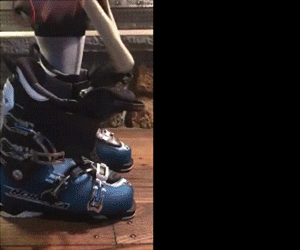Serafina
Ski Diva Extraordinaire
So yesterday after the lesson I was grooming the gelding out. Was working on the side of his butt with the second brush (the stiff one that comes after the rubber curry thing). Suddenly, he broke wind (it was impressive! and about 1 foot from my face!) - and while that was funny in a kind of Young Male sort of way - when he did it, he shied off to the side in alarm.
Yes. He seemed to have frightened himself by farting. It was another 3-5 minutes of soothing noises and letting him be before he was ready for more grooming.
DH was chatting last night about possibly making a trip to Disney's Animal Kingdom, and suddenly this memory flashed up with the subtitle "I'll Show You 'Animal Kingdom'" - I couldn't stop laughing for minutes.
I also have a question about Horse Behavior. I looked at the horse forums, but the mean age on the ones I saw looks to be about 15 years old, with everything that implies.
So here's the question. I'm taking this gelding out into the ring prior to the lesson. And he kept bumping me sideways with his head. He wasn't stopping, but he did bump me several times, deliberately. (No chance that he was just not paying attention, and I wasn't choking up on his lead line or anything).
I am not sure whether to interpret that as Being Friendly or Being Pushy. If it's Being Friendly, that's fine - he wasn't hurting me or anything. But if it's Being Pushy it seems to me that I probably ought to discourage it. I know from dogs and kids that you need to establish a pecking order (and that grownup/human needs to occupy the top slot). It seems to me that horses are at *least* as inclined to challenge and push boundaries as dogs, and maybe as much as the toddlers I've known. So I want to be careful that I do not inadvertently encourage challenges, boundary problems, issues with the power structure that are going to cause problems in riding, etc.
But - unlike Kid, Dog, or Cat - I don't really speak Horse yet...interpreting body language and noises is like listening to a foreign language where the only words I know are "please" and "thank you"...serviceable, but not conducive to developing a deeper understanding.
Also, if it is something to discourage, I'm not sure what the best way to do that is. I guess I could poke him when he does it, but I bet there is already something in his Horse Vocabulary that he would understand to mean Stop Invading My Space. He's a pretty seasoned veteran, thank god, because he's having to put up with all kinds of unintentional rubbish from me...I make a point of thanking him for his patience when I'm done. It doesn't matter if he can't understand that, I think it's important for me (and am willing to entertain the possibility that he will understand it, a little).
Anyway, is this something to appreciate or to discourage (the head bonk thing, not the first one...)
Yes. He seemed to have frightened himself by farting. It was another 3-5 minutes of soothing noises and letting him be before he was ready for more grooming.
DH was chatting last night about possibly making a trip to Disney's Animal Kingdom, and suddenly this memory flashed up with the subtitle "I'll Show You 'Animal Kingdom'" - I couldn't stop laughing for minutes.
I also have a question about Horse Behavior. I looked at the horse forums, but the mean age on the ones I saw looks to be about 15 years old, with everything that implies.
So here's the question. I'm taking this gelding out into the ring prior to the lesson. And he kept bumping me sideways with his head. He wasn't stopping, but he did bump me several times, deliberately. (No chance that he was just not paying attention, and I wasn't choking up on his lead line or anything).
I am not sure whether to interpret that as Being Friendly or Being Pushy. If it's Being Friendly, that's fine - he wasn't hurting me or anything. But if it's Being Pushy it seems to me that I probably ought to discourage it. I know from dogs and kids that you need to establish a pecking order (and that grownup/human needs to occupy the top slot). It seems to me that horses are at *least* as inclined to challenge and push boundaries as dogs, and maybe as much as the toddlers I've known. So I want to be careful that I do not inadvertently encourage challenges, boundary problems, issues with the power structure that are going to cause problems in riding, etc.
But - unlike Kid, Dog, or Cat - I don't really speak Horse yet...interpreting body language and noises is like listening to a foreign language where the only words I know are "please" and "thank you"...serviceable, but not conducive to developing a deeper understanding.
Also, if it is something to discourage, I'm not sure what the best way to do that is. I guess I could poke him when he does it, but I bet there is already something in his Horse Vocabulary that he would understand to mean Stop Invading My Space. He's a pretty seasoned veteran, thank god, because he's having to put up with all kinds of unintentional rubbish from me...I make a point of thanking him for his patience when I'm done. It doesn't matter if he can't understand that, I think it's important for me (and am willing to entertain the possibility that he will understand it, a little).
Anyway, is this something to appreciate or to discourage (the head bonk thing, not the first one...)




